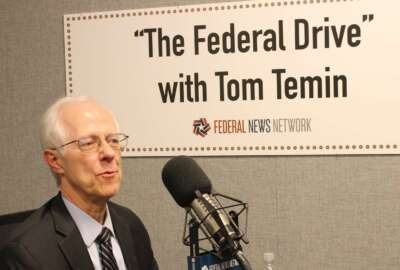
Things seem settled in Washington, but federal contractors are still uneasy
Federal employees will be getting a nice raise now. But federal contractors are not totally certain they will be able to get inflation adjustments from their ag...
Federal employees will be getting a nice raise now. But federal contractors are not totally certain they will be able to get inflation adjustments from their agency customers. That’s despite the fact that the defense authorization law specifically mentioned contract modification for inflation relief. What’s going on? The Federal Drive with Tom Temin checked-in with the President and CEO of the Professional Services Council, David Berteau.
Interview transcript:
David Berteau
Well Tom, of course inflation has been with us now for well over a year. And so we’ve got a long history here of what the impact is on contractors. PSC member companies have been talking about this with us for quite some time. There’s a number of reasons why your costs go up above what you bid. There’s just core inflation, which is running still at 7%. Year over year, then there’s the fight for talent, for labor, because you’ve got such a tight labor market, 10 million vacant jobs, and only 6 million people looking for work. Wages have gone up on average, 4.6% year over year for the past several months now. And so companies have costs that they’re incurring that wasn’t in their bid. And guess what, if they had actually bid 7% inflation and 5% wage growth, they probably wouldn’t have won the bid because somebody else would have bid a lot lower. So the government’s reaction in many cases is, hey, you bid it, you perform it. So those costs are not getting recovered.There’s two dynamics there. One is do you have the authority to do it? The second is do you have the funding available to do it? So [the Department of Defense] has put out a couple of memos. [The General Services Administration] has put out memos, other agencies are following those memos, even though they haven’t put out their own. In DoD’s case, they mostly focus on fixed price contracts. And they kind of say, suck it up. There’s not a lot of opportunity here. GSA has taken a more open ended approach to saying you can file a request for equitable adjustment, they’ve removed the cap on those requests, you can file more of them. So we’ve really got a dichotomy in terms of the way the government’s approaching. But the real issue now is what happens going forward? And as you point out, the National Defense Authorization Act included a provision specifically to allow DoD to look at reimbursing companies for for inflation related costs or just increased costs, whether it’s workforce or inflation, or supply chain, or raw materials, or transportation, or any of those things, you can’t really sort that out. So I think there’s a path forward. Question is, are they going to take it?
Tom Temin
Right, because agencies sometimes have ways of dragging their feet, to put it less politely, or slow walking these types of initiatives, or just making it so convoluted for the contractor, the next thing you know, the fiscal year is over. And that’s the end of that.David Berteau
Well, and as you know, laws don’t self implement. A change in acquisition policy has to go through the Administrative Procedure Act, you’re going have to have a proposed rule, you have to have comments on those rules. And then we’re looking at well past the first part of this year before any of that is put into play. In the meantime, though, costs still go up, companies still have to incur it, and they’ve got to get reimbursed for it, or else they suffer. This is particularly hard on smaller businesses, which don’t have a balance sheet, which face much higher cost to borrow money now, if they were gonna go to their line of credit. And so I think we’re gonna have to watch this very closely. You’re right, the NDAA includes a 4.6% increase for the military, the president just signed an executive order over the holidays giving a 4.6% increase for civilian employees, it would be foolhardy to think that companies that do business with the government aren’t in the same boat, as the military and civilian personnel, something needs to be done.Tom Temin
Sure. We’re speaking with David Berteau. He’s president and CEO of the Professional Services Council. And just to wind up that one, we should also note that, yes, the military budget is up in what constitutes nowadays the appropriations bill the omnibus. But that doesn’t mean that the money is specifically available for inflation and contracts. I mean, most of that money is spoken for.David Berteau
That’s a good point. And huge increase, $45 billion over the president’s request. And that was already $30 or $40 billion over last year. That included some money for inflation built in; where Congress, though, added money is either places where it’s easy to account for inflation, fuel costs, military construction projects, where you can actually put the inflation money on the project. Or they actually added money, but they required more work for that money. So you increase a particular line of the budget, but you actually expect more outcome. So the unit price may stay the same, the labor rates, we’re seeing agencies still put out contract proposals Tom, that has an escalator clause of barely 1% per year. Tell me where inflation is 1% per year, and we’ll see who bids on that and can perform.Tom Temin
Well nowhere in this hemisphere. And the other issue now is so that we have a Congress that will be seated and operational, I guess the Senate was already going and they sort of took some votes and went home. And then the House did its maneuver to come up with a speaker. Let’s say, I would say it’s not divided government, it’s more fractured government. And what’s your sense of how that will affect the implementation of programs, now that there is a budget for this fiscal year?David Berteau
Well, that is the question of the day, the week, the month, and the year, isn’t it? So Tom, I first came to town to work in the federal government in 1981. And in the 42 years since then, we’ve actually had divided government — that means at least one house of Congress of a different party than the president — in 29.5 of those 42 years, and it’ll soon be 31.5 of 44 years. So it’s not unusual, it’s actually about three quarters of the time that we’re dealing with this. And we have frequently found ways to be very productive. As a result of that, you know, the Budget Reform Act in 1996 was passed under that divided Congress, we’ve had a whole host of good work has come out of that.On the other hand, certainly the events of the last week don’t bode well for speedy resolution of issues. Now, many of these are important questions. What should the government be spending its money on? How do you deal with the deficit? How do you deal with the debt? Those are all critical and dynamic issues. I think one of the important things for the White House to focus on though is they’ve already got a lot of money. They’ve got a lot of programs in place, rather than focus solely on the legislative agenda with the new Congress focused on implementing and executing the programs and the funds they already have in place. That’s what contractors are ready to perform on. That’s what’s needed.
Tom Temin
There is a lot of work to be done in the oversight area too, because, like the infrastructure bill doesn’t really have much in the way of oversight mechanisms, the way some of the earlier appropriations outside of the normal governmental appropriations that we’ve seen for pandemic relief they had whether or not they were implemented very well, but they did have specific provisions for oversight and accountability.David Berteau
Exactly. And I would hope that oversight would focus actually on implementation and execution, not just on political gamesmanship associated with the programs and the funding, because there’s plenty of work to be done. One of the biggest challenges we just talked about in the inflation is the workforce shortage. That’s not only a problem for contractors, it’s a problem for the government itself; we have agencies that have 10, 15, 20, 30, even 40% vacancy rate in their program offices and their contracting officer workforce. Those need to be addressed quickly; you can’t oversee that which isn’t being done.Tom Temin
Right. That’s true. And that hiring issue also has to do with the fact that some of the nominations, I think that about 100 nominees were renominated at the beginning of the 118th session by the White House. And very often programs don’t go anywhere without quote-unquote, permanent leadership in place at the political level to make sure they do happen.David Berteau
That’s always the case. We only vote for one executive branch employee, really to the President and the Vice President. It’s really up to that individual to populate the agencies in the bureaucracy with the people to implement their objectives and their programs. It’s common for the first two years of the administration to have nominations that die at the end of the Congress. As soon as Congress adjourns sine die, those nominations that have not been confirmed cease to be valid. And what’s really unusual, and I think a very positive sign is on Jan. 3, the president renominated submitted renomination packages for 100 of those nominees whose nominations had died with the end of the 117th Congress. That in my experience is very unusual, and it’s off to a very good start. It is true that those there are some very qualified people there, they need to be confirmed. I think the real question is, how fast is the Senate move on this? You’ve got a 51-49 majority of the Democrats now, this has major implications for the committees, Tom, because under 50-50, you had exactly an equal number of Republicans and Democrats on each committee. Now you have a majority of Democrats on every committee, so they should be able to move these nominees faster. Then the final question is, do they actually get confirmed once they’re out of committee? And the Republicans have made it clear that most confirmations will have to be done through the time consuming process of cloture. But rather than wait until November or December, like we did last year, maybe the Senate can move rapidly on some of these people, get them in place. So that implementation and execution focus that I talked about, will actually have the hands on the steering wheel to make it happen.
Copyright © 2024 Federal News Network. All rights reserved. This website is not intended for users located within the European Economic Area.
Tom Temin is host of the Federal Drive and has been providing insight on federal technology and management issues for more than 30 years.
Follow @tteminWFED
Related Stories





